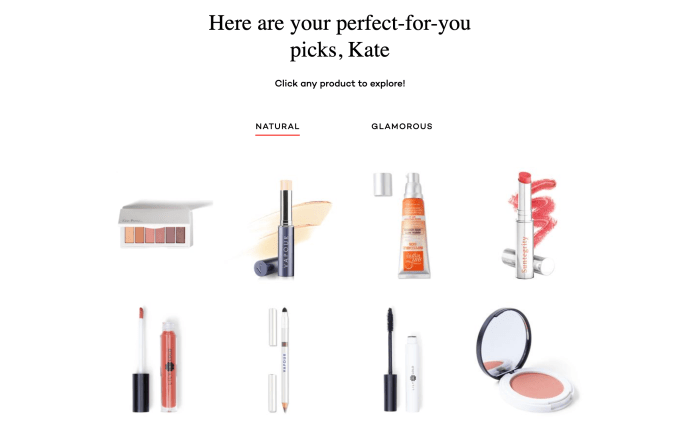NakedPoppy co-founders Jaleh Bisharat and Kimberly Shenk are an impressive duo. Bisharat, the startup’s chief executive officer, is a commanding presence and a bona fide marketing savant. The perfect compliment to Shenk, a reticent and data-focused chief product officer.
Together they’re building a cosmetics startup, NakedPoppy, where people can purchase high-quality “clean” makeup, or sustainable, ethically-made and cruelty-free products produced without harmful chemicals. It launches today with $4 million in venture capital backing from top investors, including Cowboy Ventures (the seed-stage fund led by Aileen Lee), Felicis Ventures, Khosla Ventures, Maveron, Polaris Ventures and Slow Ventures.
“Conventional makeup is considered hazardous waste by the EPA,” Bisharat tells TechCrunch. “You can look better and go clean.”
But NakedPoppy isn’t just another website for buying makeup. Like all companies today, it’s a tech company. NakedPoppy’s patent-pending personalization algorithm helps customers quickly find makeup that matches or complements their skin tone. To do this, customers are asked to complete a three-minute assessment and submit a photo of their wrist, which is used to pinpoint their base skin color.

“I’m not the person that is up to trends or is keeping up with the YouTube stars,” NakedPoppy’s product chief Shenk tells TechCrunch. “When I walk into Sephora my stomach drops … I am the kind of woman that wants to set it and forget it. Just give me the right thing and let’s move on.”
Bisharat adds that NakedPoppy targets the busy woman: “The one for whom it’s not entertainment to go shopping for makeup.”
The NakedPoppy team hopes its algorithm expedites the makeup shopping process for those who view the task as a chore not a hobby. Accounting for skin type, skin color, skin undertone, age, eye color, hair color, allergies, sensitivities and more, the startup presents each customer a filtered and tailored list of the 400 items its carries, ranging from lipsticks to foundation to blush and more. Cosmetic chemists screen all NakedPoppy products to ensure they were made with only clean ingredients.
Alongside its official launch, NakedPoppy is announcing its debut original product: Liquid eyeliner. The product was screened and tested by a number of clean beauty experts and even a VC: “This is a hero product, no doubt about it,” BBG Ventures’ managing partner Susan Lyne said in a statement. Lyne, of course, is a NakedPoppy angel investor. “Most eyeliners start drying out after a few weeks and get harder to apply. This one is still as supple as the day I got it. It looks natural, lasts all day and washes off easily with soap. It’s pretty perfect.”
For the record, I tried out the NakedPoppy eyeliner too and can attest to its greatness.

NakedPoppy co-founders Jaleh Bisharat (CEO, left) and Kimberly Shenk (CPO, right).
The women behind NakedPoppy, as I alluded to earlier, know what they’re doing. In fact, I’d go as far as to say they could’ve paired their marketing and data science expertise to build just about anything. Makeup, however, was their shared passion.
“For us, it’s a personal passion and an area of information asymmetry, like most people know that with the food you eat, you should try to eat organic or as healthy as you can, but you’d be surprised how few women — they just assume the FDA protects them,” Bisharat said. “The idea is to educate the world and help women move toward new solutions.”
Bisharat got her start in marketing two decades ago. Shortly after the e-commerce giant went public, she served as the vice president of marketing at Amazon. A career peak for many, Bisharat went on to lead marketing efforts at OpenTable, Jawbone, UpWork and, most recently, Eventbrite, where she met Shenk.
Before moving into the private sector, Shenk got her start as a data scientist in the U.S. Air Force, ultimately ending up as the director of data science at the now-public ticketing and events business, Eventbrite.

Bisharat and Shenk remained mum on what marketing tactics they’ll deploy to capture the attention of potential customers. Will they partner with social media influencers to spread the word? Double down on Instagram ads? Open brick-and-mortar shops? They wouldn’t say. Additional original products are definitely in the works, though, as is a foray into skincare and ultimately, a full-fledged dive into all self-care products.
The hope is to making buying clean makeup easy. Historically, the big makeup brands have been owned and operated by one of a dozen or so large companies dominating the space. Increasingly, however, direct-to-consumer brands and startups, most notably Glossier, have attracted customers that prioritize ease-of-access.
As the beauty industry adjusts, an influx of digital-first upstarts, NakedPoppy included, will be poised to steal market share from the long-reigning giants. Perhaps NakedPoppy’s push toward transparency in ingredients and production will encourage the big brands to do the same.
Comments
Post a Comment